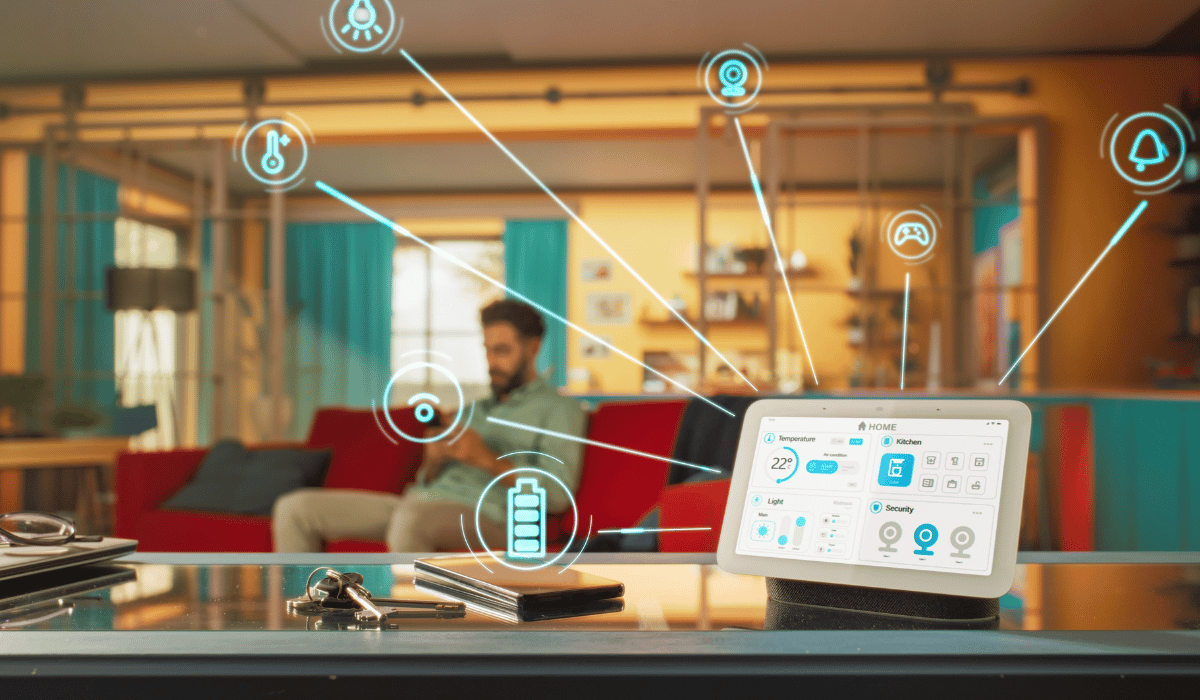Making your home smarter with Feng Shui mixes modern tech with timeless balance. Using smart devices can make your home more convenient and help keep good energy. This article will give you 5 easy tips to match smart home features with Feng Shui, turning your space into a perfect mix of modern comfort and peaceful energy.
See also: Feng Shui for your desk placement
Smart lighting
Smart lighting lets you adjust the brightness and colour of your lights easily. Use warm, soft lights in areas where you want to relax and feel balanced. For places like the kitchen or home office, choose brighter, cooler lights to boost energy.
Smart speakers
Sound plays a big role in shaping the energy of a space, according to Feng Shui principles.
- Sound is a vibration that can greatly affect the feel of a room and the energy within it.
- Soft nature sounds, like rustling leaves, flowing water, or birds singing, can create a peaceful and calming atmosphere.
- Gentle music, such as classical or instrumental tunes, helps promote relaxation and balance.
- Meditation sounds, like Tibetan bowls, ocean waves, or rain, can help you relax and stay mindful.
- Smart speakers can be used to play relaxing sounds in different rooms, depending on the room’s purpose.
- Soundproofing materials or white noise machines can help reduce loud, disturbing noises like traffic or electronics.
- Creating quiet zones in your home can provide spaces for relaxation and meditation.
- Experimenting with different sounds can help you find what feels most calming and harmonious.
- Strive for a balance—too much quiet can be unsettling, so find a soundscape that supports your well-being.
Smart thermostats
- Temperature is key in Feng Shui, needing a balance between hot and cold, much like Yin and Yang.
- Extreme heat can create restless energy, while extreme cold can make the energy feel stuck and slow.
- The best temperature is one that makes you feel comfortable and at ease.
- Adjust the indoor temperature with the seasons—cooler in summer for clarity, warmer in winter for cosiness.
- Smart thermostats let you set the temperature just right for your needs.
- Keeping a steady temperature can save energy, which fits with Feng Shui’s focus on sustainability.
- In larger homes, use thermostats that control different zones so each room can have the right temperature for its purpose.
- Avoid changing the temperature too quickly, as this can disturb the energy flow.
- Don’t forget about humidity; a balanced level helps avoid too much dryness or dampness.
- The perfect temperature is personal—try different settings to find what suits you best.
Smart storage solutions
- Clutter blocks the flow of energy, creating a negative environment in your home.
- Smart storage solutions help declutter and improve the energy in your space.
- Hidden storage like automated cabinets keeps things out of sight, creating a clean and calm atmosphere.
- Smart storage makes the most of your space, keeping every area functional and free from clutter, which helps energy flow better.
- Easy-to-reach storage encourages regular cleaning, preventing clutter from piling up and helping you stay focused.
- Sleek storage systems create a visually pleasing and harmonious environment.
- Automated cabinets can hide kitchen appliances or supplies, making your kitchen look neat and inviting.
- Hidden storage in furniture like beds or coffee tables can store items like blankets or remote controls.
- Vertical storage options like tall cabinets help you store things out of sight and maximise space.
- Regularly declutter, clear the energy in your space, and be mindful of what you bring into your home to maintain a positive environment.
Tech-free zones
- Too much screen time can cause mental and emotional exhaustion, disrupting positive energy.
- Having multiple screens creates visual clutter, which is bad for the energy in your space.
- Constant notifications and screen distractions make it hard to focus, draining your energy.
- Set up areas in your home where no electronic devices are allowed, focusing on relaxation and unwinding.
- Keep the bedroom free from technology to create a peaceful and restful environment.
- Make the dining table a place for family time without the interruption of screens.
- Create an outdoor area where you can disconnect from technology and connect with nature.
- Use smart features to monitor and limit your screen time to control your digital habits.
- Schedule regular breaks from technology to refresh your mind and body.
- Choose energy-efficient devices to reduce the impact of electromagnetic fields in your home.
FAQs
Feng Shui is an ancient Chinese practice that focuses on creating harmony and balance in living spaces. Smart homes can enhance Feng Shui principles through technology.
No, small changes can make a big difference. Start with simple adjustments and gradually incorporate more Feng Shui elements.
Start with decluttering, using natural light, and incorporating plants into your home.
Select colors that resonate with you and create a harmonious atmosphere. Consider using smart lighting to adjust colors based on mood.
Arrange furniture to allow for smooth energy flow. Avoid blocking doorways or creating obstacles.
Use natural materials, incorporate plants, and choose colors and decor that represent each element. What is Feng Shui and how does it relate to smart homes?
Is it necessary to completely overhaul my home to achieve a Feng Shui-inspired smart home?
What are some easy Feng Shui tips for a beginner?
How can I choose the right colors for my Feng Shui-inspired smart home?
What role does furniture placement play in Feng Shui?
How can I incorporate the five elements (wood, fire, earth, metal, water) into my smart home?
| Got any questions or point of view on our article? We would love to hear from you. Write to our Editor-in-Chief Jhumur Ghosh at jhumur.ghosh1@housing.com |







